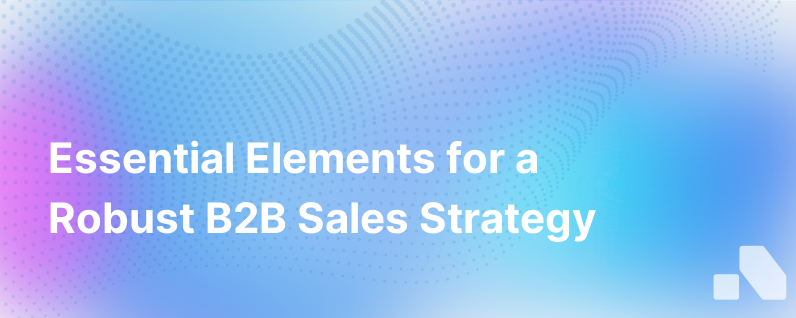
The dynamism of B2B (Business-to-Business) marketplaces requires sellers to continuously refine their sales strategies to maintain a competitive edge and appeal to sophisticated buyers. Navigating complex sales cycles and an expanding decision-making unit, B2B sales strategies have to be multifaceted and robust.
In this article, we delve into the key elements that form a successful B2B sales strategy, ensuring you have a comprehensive roadmap for your sales teams to foster meaningful relationships, deliver value, and drive conversion.
Precise Positioning and a Strong Value Proposition
Positioning your product or service starts with a clear, compelling value proposition. It is vital to articulate how your offering aligns with the needs, pain points, and business objectives of your target audience. A strong value proposition communicates the unique benefits of your solution, distinguishing it from competitors.
Example:
Elevate your operations with [Your Product]: the streamlined, AI-enhanced solution that cuts through the noise to deliver results that matter. Harness precision insights to steer your organization toward uncharted success spheres!
Data-Driven Buyer Personas
Understanding your buyer is the linchpin of B2B sales. Developing nuanced buyer personas driven by data analytics ensures that you're tailoring your outreach and product development to the right audience. By understanding the roles, needs, and behaviors of each persona, you can craft targeted messages that resonate and convert.
Actionable Tip:
Conduct interviews and surveys with current customers and prospects to gather qualitative data, enriching your personas with the depth required for nuanced sales narratives.
Seamless Omnichannel Experience
Today's B2B buyers interact with vendors across a multitude of channels. Your strategy should deliver a seamless, unified experience whether the interactions occur through your website, social media, email, or in-person. This consistency builds trust and positions your company as a reliable and customer-centric brand.
A Consultative, Educative Sales Approach
A strong B2B sales strategy transcends transactional exchanges, embedding a consultative approach that positions your representatives as thought leaders and advisors. This requires in-depth knowledge of the industry and the challenges buyers face, enabling your team to educate prospects and offer solutions that drive transformation.
Best Practice:
Implement regular training sessions for your sales team focused not only on product knowledge but also on industry trends and foresights that enhance their advisory capabilities.
An Engaging, Empathetic Customer Experience
B2B buyers often have complex needs and priorities that require a delicate balance between professionalism and genuine engagement. Creating a customer experience that is both efficient and empathetically aligned with these needs helps in fostering long-term relationships and customer loyalty.
Account-Based Marketing Alignment
Complementing a strong sales strategy, account-based marketing (ABM) targets high-value accounts with personalized campaigns, directly involving them in the development of solutions. The synergy between sales strategies and ABM ensures that your efforts are concentrated on the most promising prospects.
Strategic Move:
Integrate sales and marketing efforts by sharing data and insights across both teams, enabling a smooth, collaborative push towards desired accounts.
Analytical Rigor and Continuous Optimization
B2B sales strategies should never be stagnant. Use data analytics for continuous optimization, making informed decisions about resource allocation and tactical adjustments. Leveraging CRMs and advanced sales platforms provides visibility into performance metrics and areas for improvement.
Strategic Use of Technology
Investing in the right technology stack can enhance the efficiency and effectiveness of your B2B sales strategy. Tools that automate repetitive tasks, provide actionable insights, and facilitate communication can be the lever to amplify your sales team's efforts.
Technology Spotlight:
Platforms like Aomni offer sales automation tools that streamline information gathering, lead nurturing, and opportunity management, affording your team more time to focus on closing deals.
As B2B sales landscapes evolve, a well-crafted sales strategy is indispensable. By synthesizing precise positioning, informed buyer personas, a multichannel approach, a consultative mindset, empathetic experiences, aligned marketing, and robust analytics, B2B organizations can secure their foothold in the competitive market.
In a space where personalization and efficiency reign supreme, technological solutions that offer real-time data and actionable insights become valuable allies. Platforms similar to Aomni can provide sales teams with the resources they need for a strategic sales approach.
In blending these key sales strategy components with innovative tools, B2B sales teams can not only exceed their current targets but expand their horizon to untapped opportunities, thus ensuring a pathway to consistent growth and sales excellence.
Sources:
- 4 Key elements of a successful B2B Sales strategy - Atento
- How To Communicate Your B2B Value Proposition More Effectively
- Sales automation: The key to boosting revenue and reducing costs
- Leadfeeder | 20 Lead Generation Strategies to Generate B2B Sales Leads in 2024
- How to Create a Strong Value Proposition for B2B Marketing & Sales
- The 32 Best Ways to Generate More B2B Sales Leads
- 7 Steps to a Better B2B Customer Value Proposition Strategy
- The New Rules of B2B Lead Generation